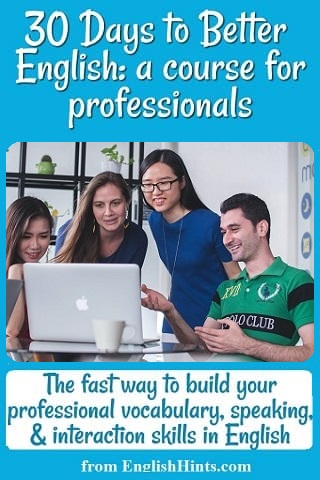30 Days to Better English: A Flexible Plan for Reaching Your Professional Goals
Would you be interested in a course that offered a personalized plan for 30 days to better English?
You may be thinking, “There’s no way I can get my English to the level I need or want in 30 days, especially not in the time I have available!”
Maybe you use English often at work but still feel uncomfortable about speaking up in meetings.
You may feel unsure that you can express yourself well enough in English to convince coworkers or managers of the value of your ideas. You might even wonder if they understand you!
How could 30 days make a difference?
You’re right that mastering any language is a long process.But if you are reading this, you have already come a long way. If you know what you need to work on and can get focused, systematic help to address your problems, you can make real progress in less time than you expect.
You may have a busy schedule and a lot of responsibilities. But can you find 30-50 minutes a day for two or three days a week? Then in a few months (or less if you have already mastered some of the topics) you can finish these 30 short-- but carefully designed-- lessons. You should see a real improvement in your English!
30 days is time enough to overcome most pronunciation problems. It's enough to master the use of essential professional vocabulary-- & strategies for learning more. Most importantly, you will gain the confidence to use what you already know.
How Can I Be Sure that 30 Days Can Make Such a Difference?
I’ve been helping people learn English for years. For the past five years, I've also been coaching international scientists in English with individual lessons using a program similar to this course. (See Develop Your English Speaking Skills.)
Most can read English fluently, but many have struggled with pronunciation and speaking skills. (Some still find them difficult after living in the U.S.-- or using English in their work-- for years!)
They also want help in increasing their English vocabulary, and in choosing the right words for their needs.
Using this step-by-step program has made a real difference for them. It's especially helped their confidence, vocabulary, and the clarity of their pronunciation. I’m confident that if you'll invest the time, these lessons can do the same for you.
If you'd like, go directly to the course information summary. You can sign up to hear about it when it's ready. There are more details on what's included in the course immediately below the sign up form..
Who This 30-Day Course Can Help
This course is designed for non-native English-speaking professionals who can already read English well but want to speak (and maybe write) it more effectively.
My experience is in coaching scientists, mostly in the bio-tech and pharmaceutical industries, who use English at work at least occasionally but want to be able to participate and persuade in meetings in English like the competent professionals they are.
It’s designed to help very busy people with varying levels of experience in English fill in the gaps in their competencies, from pronunciation or grammar issues to lack of opportunities to actually speak with others in English. Some people will need fewer than 30 “days” (practice sessions) and few or no live lessons with me, so this program can be done mostly or entirely on a self-study basis.
Others may need to repeat some sessions (so have a few more than 30) and may need much more personal guidance from me—though probably fewer than 10 “live” lessons, based on my experience, at least if you don’t have major pronunciation issues that prevent people from understanding you in English.
But everyone can choose the frequency and the time for their lessons—so you can keep making progress at a pace that works for you.
How 30-Days to Better English Can Help You
If you’re reading this, you already have a good understanding of English. What’s important is to work on whatever is blocking you from sharing your thinking effectively in English.
It might be a pronunciation problem. (Most likely it's at least partly related to word stress or vowel sounds.) There are some simple checks and exercises that can help.
It might be a need for a few relevant words that express your ideas more accurately, so they’re not misunderstood.
It might be uncertainty about the "rules" and expectations for writing in English.
It might be a lack of confidence that holds you back from speaking up.
You can overcome many of these communication problems in less time than you think. All it takes is a well-planned program and an understanding of where to focus your efforts.
By the end of "30-Days to Better English," you will have:
• learned English word and sentence stress patterns that will make your English easier to understand.
• rehearsed persuading your boss, team, or client of the value of an idea or process you want them to adopt (or ways to convince them to avoid a bad idea instead.)
• practiced the business English skills for interrupting politely when necessary and working on a team.
• learned and used common business phrases including phrasal verbs & very common idioms.
And if needed:
• practiced "small talk" or networking and meeting conversations enough to feel comfortable using English in most social situations.
• practiced writing emails, meeting summaries, & short reports using English business writing formats.
• studied the sounds of American English and some rules to recognize the most common ways to spell them.
• learned to choose the best words for you purpose
• reviewed English grammar topics that have been difficult for you, so you can feel more confident speaking or writing in English

"30 Days to Better English" Course Summary
I’ve been working to convert my one-on-one lessons program into a “30 Days to Better English” online course. It will be a less-expensive, mainly self-paced alternative to my program.
(You can also practice a few of the lessons with me for a limited extra fee if you choose—especially valuable if you don’t have many opportunities to use English with others currently.)
The lessons are mostly brief videos, readings (and a few talks), and workbook or partner practice.
These lessons are organized into 10 modules of three lessons each. (Some modules have more than three, so you can choose the ones that are most useful to you.)
Almost everyone will benefit from the lessons in the first four (core) modules. The remaining modules emphasize other skills you may need to work on, including English pronunciation, vocabulary, grammar and writing, or interview practice. Mix and match to get what will help you the most, whether it only takes you twelve to fifteen days (lessons) or forty-five to fifty.
The modules are:
1. Key English Communication Skills: Listening, questions and answers, and conversations
2. Participating in meetings, including important vocabulary and phrases
3. Skills (and vocabulary) for persuasion
4. Skills for speaking clearly, including stress and rhythm
5. Pronunciation practice (if needed—and add a second module if needed)
6. Vocabulary building, choices, and connotations
7. Email writing, summarizing, and other key writing skills
8. -9. Grammar review as needed: tenses, sentence structure, verbs followed by gerunds or infinitives, prepositions, compound sentences, or other grammar issues that you find difficult
9. (continued—or more vocabulary or listening practice, depending on your priorities.)
10. Interview practice or specialized skills
You will have the option of taking just part of the course (two or more modules, depending on your specific needs). Then you can continue with any others as you need them. (Of course, if you know you want the whole course, there will be a discount.)
Module 1: Basic English Communication Skills: Listening, Questions and Answers, and Conversations
L. 1: 2-way communication & the importance of listening. Questions, including checking for understanding & verifying assumptions. Introducing the listening/reading practice.
L. 1 Practice: Read about & watch a TED talk on how to explain anything clearly. Then think about your own work. Write the key points to briefly explain your work to 2 English-speaking audiences: a scientist in another field & an interested friend of a friend. You’ll use these for networking later.
L. 2 introduces and practices networking and the difference between Yes-No and Open-ended (Information or WH-) questions in English.
L. 3 discusses small talk conversations and how to adapt your message for different situations & levels of formality. We'll practice explaining what you do and have done in small talk, at a networking event, or at a job interview.
Module 2: Meetings in English

L. 1: Participating in meetings: how-tos and vocabulary
L. 2: Useful phrasal verbs for meetings
L. 3: Business idioms in English
Module 3: Persuasion
L. 1: Key skills for persuasion, including reading a related article (for practice)
L. 2: Pros & cons & how to disagree without being disagreeable
L.3: More vocabulary for persuasion
Module 4: Speaking Clearly in English including Using Rhythm and Stress
L. 1: Word and syllable stress with professional vocabulary examples.
L. 2-3. Connected speech (lesson with me)
OR Homophones or other lessons from Mod. 5.
Module 5: Pronunciation Practice
L.1:'Short' and 'long' vowel sounds and practice
L. 2 Short & Long Vowel Rules. (Practice with the brief Short & Long Sounds Quiz.)
L. 3: Other Vowel Sounds (AU/AW, OI, & OO, OU, OW when not pronounced with the long or short sounds.) Practice: Fill in a worksheet putting some very common words into columns based on their vowel sounds.
Alternates (I would suggest the 3 lessons above for most people. Some will need or want these instead-- or instead of the current Mod. 6.)
L. 4 Common Homophones (like to, too, or two, for or four, their, there, or there). Recognition & spelling practice. (These are common sources of writing errors among native speakers too.)
L.5: The Common Consonant Sounds of American English. (an extra long video-- 15 min.)
L. 6: choice of practice with L & R minimal pairs (and of the consonant blends bl, br, cl, cr, fl, fr, gl, gr, pl, & pr, plus sentences and a dictation (& a second set-- 5B-- if you need even more practice)
OR L.7: a video on vowels followed by Rs, with related practice activities.
Module 6: Word-building & Vocabulary Skills
L. 1: Connotations and word choice
L. 2 : Word-building: an introduction to word roots and prefixes
L. 3: More vocabulary-building skills including using context clues. Read an article using some of the module's vocabulary to discuss some current issues (Covid-19, vaccine research, & the role immigrants played in developing vaccines.)
Module 7: Emails and Writing Skills
L. 1 will look at good business email writing practices in English.
L. 2 will look at general English writing skills and the importance of revision & proofreading.
L. 3 will practice summarizing (or a specific aspect of writing you want to work on, such as article use.
Module 8-9: Grammar Review (or Other Personalized Needs)
Possible grammar lessons (choose the ones you want to review from at least these 11 options): using the past tense, learning irregular past tenses, the perfect tenses, conditional tenses, present v.s. present continuous tense, future tenses, contractions, sentence structure, verbs followed by gerunds or infinitives, comparatives and superlatives, prepositions, compound sentences, or other grammar issues that you find difficult
Other possible options: More on Building Vocabulary. Developing and practicing a presentation L. 1-2. Listening techniues and suggested podcasts or talks for listening: l.1-6...
Module 10: Interview Practice (or Other Personal Choices)
L. 1: Prepare a CV (resume)
L. 2-3 Practice for a job interview (usually on your own and then including a live session with me, but I can provide guidance if you want to practice on your own fo both lessons.)
Are You Ready to Take Your English to the Next Level?
The full 30-days to Better Professional English course is not currently available as I'm working on some changes to make it more usable, but it may be soon. In the meantime, you can contact me on the form below if you are interested or have any questions.
Options for Individual Needs
The full course described above is not available currently, but I offer several shorter versions based on different needs.
You can contact me below if you need a different combination of lessons, and I can probably arrange what you need. I expect the courses to be:
- several vocabulary and/or speaking challenges-- contact me to learn what is currently available.
- a membership program for people who want to study my materials at their own pace.
